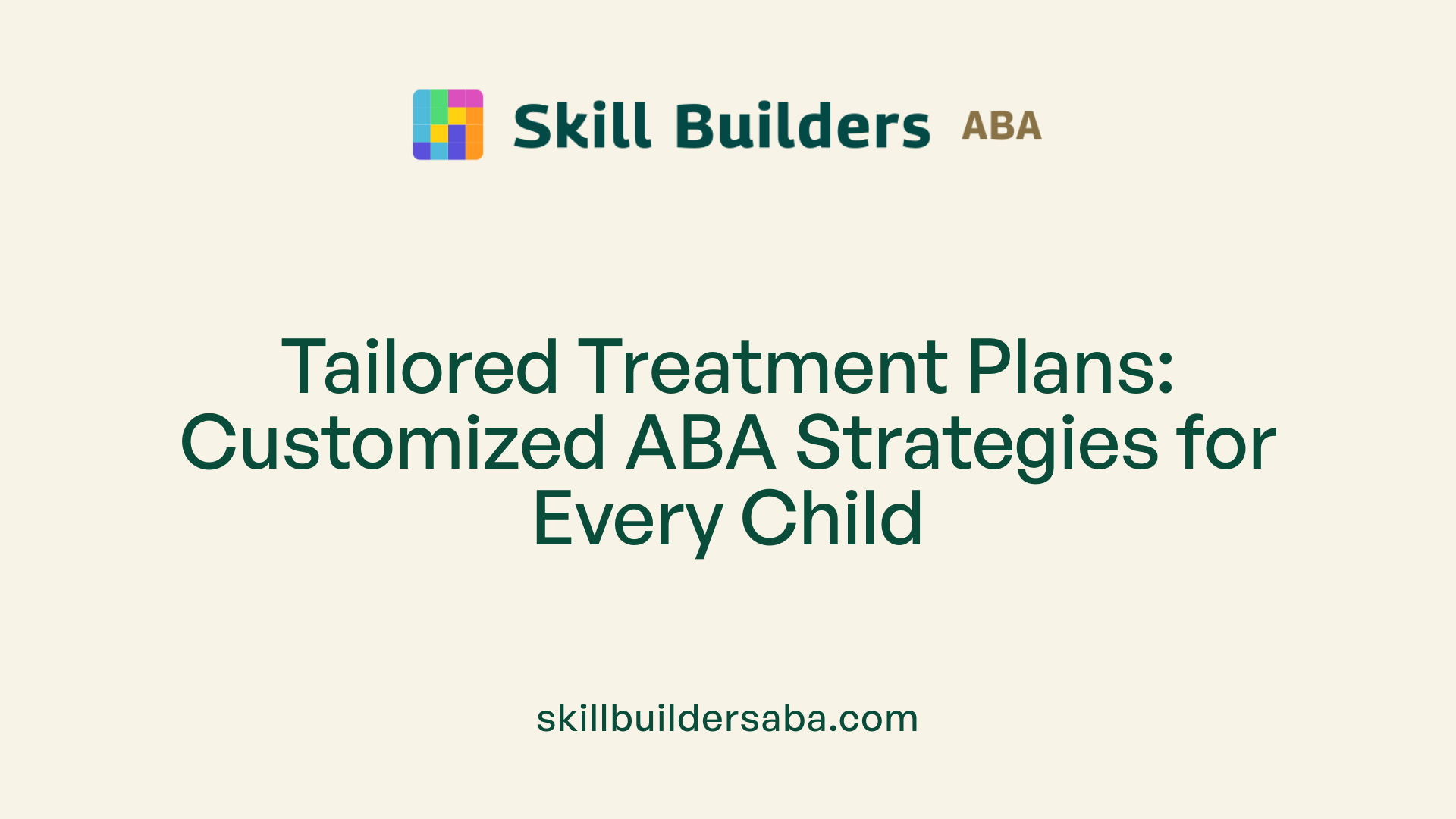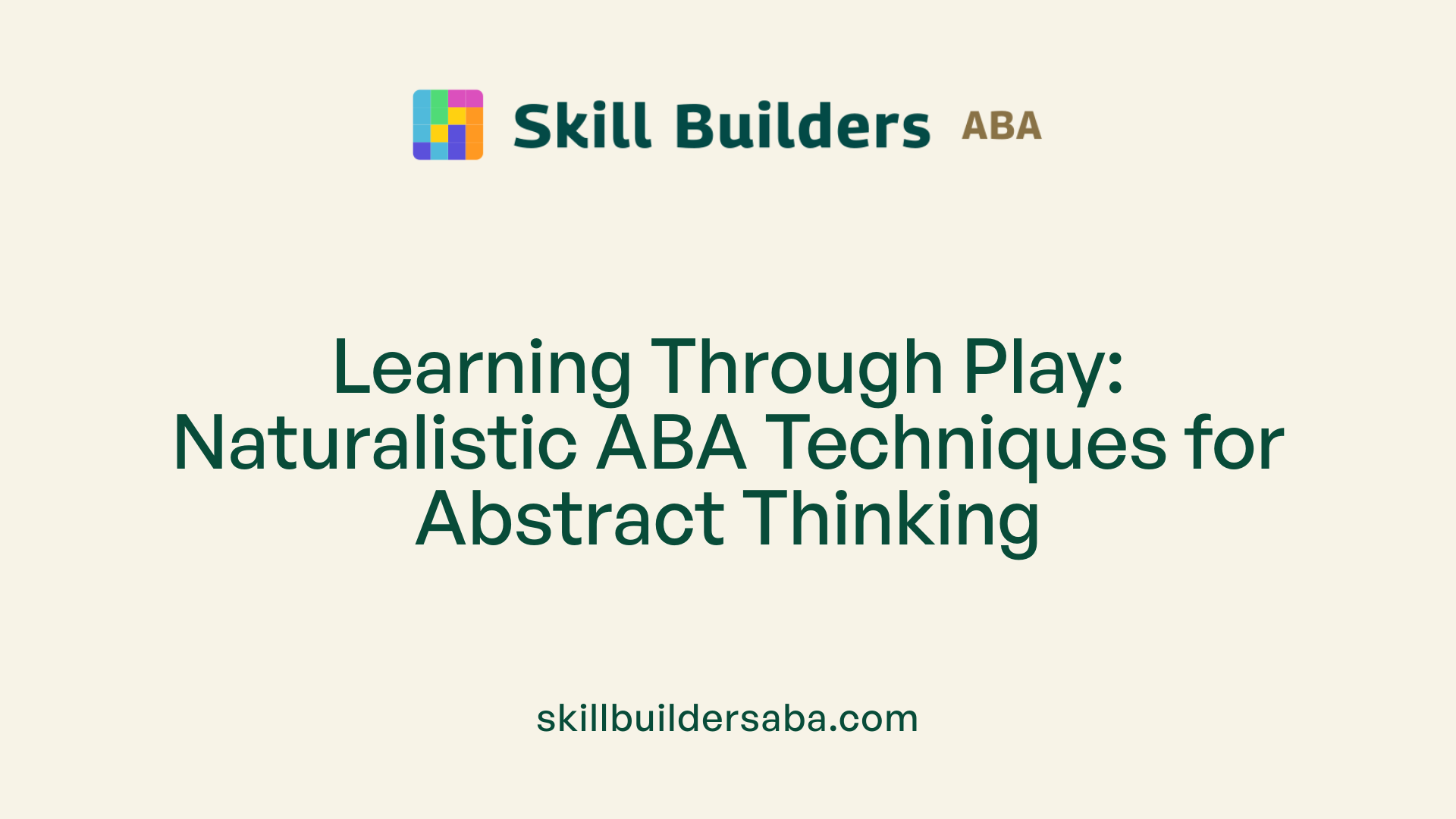
Supporting abstract thinking development through ABA
Unlocking Cognitive Growth: The Power of ABA in Fostering Abstract Thinking
Understanding Abstract Thinking and Its Importance
Abstract thinking is a fundamental cognitive skill that allows children and adolescents to understand concepts beyond the here and now, facilitating problem-solving, reasoning, and creative thinking. Supporting its development is crucial for academic success, social interaction, and independence. Applied Behavior Analysis (ABA) offers evidence-based strategies to nurture these higher-order skills, especially in children with developmental challenges such as autism.
The Foundations of ABA Therapy and Its Recognition

What is ABA therapy and how is it recognized?
ABA (Applied Behavior Analysis) therapy is a scientifically supported treatment designed to help children with autism improve various skills and behaviors. It utilizes techniques rooted in behaviorist principles to promote positive change.
This approach has gained widespread acknowledgment as a highly effective intervention. It is recognized as the gold standard for autism treatment by prominent organizations including the American Psychological Association and the US Surgeon General. These endorsements reflect the therapy’s proven ability to support children in developing social, communication, academic, and self-management skills.
ABA therapy involves a personalized process that includes family interviews, behavioral testing, direct observation, and review of medical reports. Trained professionals such as Board Certified Behavior Analysts oversee the programs, ensuring that interventions are tailored to each child's unique needs.
Moreover, ABA centers prioritize a neuroaffirming, respect-based approach that values neurodiversity and individual strengths. Treatment plans are flexible, incorporating naturalistic teaching methods, play routines, and sensory considerations. Regular progress reports and family involvement are vital components, enhancing the therapy’s effectiveness.
In summary, ABA remains a cornerstone in autism intervention, supported by rigorous research, professional certification, and a child-centered perspective, making it a trusted choice for many families seeking meaningful developmental progress.
Core Objectives of ABA in Cognitive Development

Skills targeted by ABA (social, communication, adaptive, cognitive)
Applied Behavior Analysis (ABA) focuses on a broad range of skills to support children with autism. These include improving social interactions, such as sharing and turn-taking, and enhancing communication abilities like speech and comprehension.
Adaptive skills, like self-care and daily routines, are also emphasized to promote independence. Additionally, ABA targets cognitive skills by teaching children to recognize patterns, understand more abstract concepts, and solve problems, which are essential for learning and daily functioning.
The therapy employs naturalistic teaching methods, making learning engaging through play and routines that respect sensory sensitivities. These approaches help children develop skills at their own pace, allowing for tailored growth in social, communication, adaptive, and cognitive areas.
Focus on behavior management and emotional regulation
Behavior management is integral to ABA, helping children develop appropriate responses and reduce problematic behaviors. Techniques involve positive reinforcement to encourage desirable behaviors.
Emotional regulation is also a focus, assisting children in managing their feelings and reactions. This support fosters emotional resilience and self-management, contributing to overall well-being.
How does ABA support cognitive development?
ABA therapy enhances cognitive development by systematically teaching children to recognize patterns, understand abstract concepts, and apply reasoning beyond concrete facts. Through consistent practice and reinforcement, children learn to think more flexibly and develop problem-solving skills.
The individualized nature of ABA ensures that each child's unique strengths and needs are considered, promoting steady cognitive progress. Regular assessments and progress reports help adapt the therapy to maximize learning outcomes.
The Role of Qualified Professionals in ABA Delivery

Who provides ABA therapy and how are protocols established?
ABA therapy is delivered by highly trained professionals known as Board Certified Behavior Analysts (BCBAs). These specialists hold Master’s degrees and have met strict certification standards set by the Behavior Analyst Certification Board (BACB). Their extensive training ensures that each child's treatment plan is carefully tailored to their unique needs.
Training and certification of BCBAs
BCBAs undergo rigorous education and supervised practical experience to qualify for their certification. This expertise allows them to develop customized intervention strategies, observe and analyze behavior, and modify approaches based on ongoing progress assessments.
Importance of tailored, individualized treatment plans
Every child is different, and ABA therapy recognizes this by creating personalized treatment plans. These plans are based on comprehensive intake procedures, including family interviews, behavioral testing, and observation. Progress is regularly reviewed with families involved in decision-making, ensuring that therapy remains aligned with the child's evolving needs.
This collaborative and individualized approach, overseen by certified professionals, maximizes the effectiveness of ABA therapy in fostering communication, social skills, independence, and emotional regulation.
| Aspect | Details | Additional Notes |
|---|---|---|
| Provider | BCBAs with Master’s degrees and BACB certification | Ensures expertise in behavior analysis |
| Personalization | Treatment tailored to each child's unique profile | Includes family input and ongoing assessments |
| Oversight | Regular progress reporting and adjustments | Facilitates adaptive and responsive therapy |
Assessment and Customization in ABA Interventions

How is ABA therapy tailored to individual children?
ABA therapy is highly personalized to meet each child's unique needs and strengths. The process begins with a detailed intake phase, where a team of trained professionals gathers information through various methods.
During the initial assessment, family interviews play a crucial role. Therapists speak with parents and caregivers to understand the child's background, behaviors, and daily routines. This collaborative approach ensures that family insights inform the treatment plan.
Next, testing and formal observations are conducted to assess the child's current skills and challenges across social, communication, adaptive, and academic areas. Observations in the therapy environment help therapists see how the child responds to different teaching strategies and routines.
Additional reports from neuropsychologists or developmental pediatricians are reviewed to provide a comprehensive understanding of the child's developmental profile.
Based on this information, a multidisciplinary team develops an individualized ABA plan. These plans are designed to support skill development—ranging from behavior management to emotional regulation—and are adjusted regularly based on progress reports.
Therapies incorporate naturalistic teaching approaches, play, and routines that are sensitive to sensory needs and promote independence. Family involvement is integral, with continuous collaboration to adapt goals and strategies, ensuring meaningful progress tailored specifically to each child's journey.
For more detailed insights into personalized ABA assessment methods, consulting specialized resources can be helpful.
Incorporating Naturalistic Teaching Methods and Routines

How does ABA incorporate play to develop abstract skills?
ABA therapy makes extensive use of play and routines that respect the child's sensory sensitivities. Naturalistic teaching methods, such as play-based learning and routines embedded in everyday activities, are central to this approach.
Play sessions—often called naturalistic or floor time sessions—encourage children to explore, express, and develop their imaginative capacity. These activities are designed to be engaging and meaningful, helping children build social and cognitive skills in a relaxed setting.
By integrating creative and symbolic play, ABA therapists foster children’s self-expression and flexibility. This use of play allows children to practice abstract thinking, improve problem-solving, and develop adaptive skills. The routines serve as natural contexts where children can learn to regulate emotions, make decisions, and interact more effectively.
ABA’s focus on these naturalistic methods not only respects sensory sensitivities but also promotes autonomy. Children are encouraged to make choices during play, boosting their confidence and independence.
This approach aligns with a neuroaffirming, strength-based philosophy that values each child's unique abilities and preferences. It involves families in planning and executing routines that are enjoyable, supportive, and tailored to the child's development needs.
For more detailed insights into such methods, searching “Naturalistic ABA play methods” can provide additional resources and practical examples.
Strategies and Activities to Promote Abstract Thinking
ABA therapy employs various strategies to enhance a child's ability to think abstractly. Visual aids are one such tool, helping children recognize patterns, make connections, and understand complex ideas through images or symbols. Analogy-based learning is another approach, where children relate new concepts to familiar ones, facilitating higher-level reasoning.
Categorization tasks also play a vital role, encouraging children to classify objects or ideas, which fosters organizational and conceptual skills.
Moreover, therapy incorporates Discrete Trial Training (DTT) and Video Modeling-Based Teaching (VBT). DTT involves breaking down skills into small, manageable steps and reinforcing problem-solving and language skills through repeated practice and positive feedback. VBT uses videos to demonstrate desired behaviors or skills in real-life contexts, helping children imitate and generalize these skills.
These activities are part of a personalized treatment plan overseen by Board Certified Behavior Analysts (BCBAs), who ensure that methods are tailored to the individual child's needs.
By combining these techniques, ABA therapy supports children in developing the cognitive flexibility necessary for abstract thinking. This approach encourages autonomous decision-making, promotes understanding of complex relationships, and helps children generalize skills across different settings.
For those interested in learning more about specific ABA activities for fostering abstract thinking, searching for
Behavioral Reinforcement and Skill Generalization
How does ABA enhance abstract reasoning?
Applied Behavior Analysis (ABA) utilizes specific reinforcement strategies and modeling techniques to support children in applying their skills across various settings. By consistently rewarding desired behaviors, ABA encourages children to recognize and understand more complex, abstract concepts.
Reinforcement helps solidify learning by motivating children to engage in tasks that foster reasoning skills. For instance, when a child demonstrates understanding of a concept, immediate positive feedback or reward is provided, reinforcing that behavior. Over time, this approach helps children generalize skills from the therapy environment to everyday life.
Moreover, ABA incorporates naturalistic teaching methods, promoting autonomous decision-making and encouraging children to explore abstract ideas in familiar routines and play. This approach respects sensory sensitivities and emphasizes an individualized plan, which is crucial for supporting cognitive development.
In summary, ABA's reinforcement techniques and an emphasis on modeling enable children with autism to develop stronger reasoning skills, improving their capacity to understand and apply abstract concepts across different settings.
| Technique | Description | Impact on Cognitive Development |
|---|---|---|
| Positive reinforcement | Rewards for demonstrating targeted behaviors. | Encourages skill acquisition and motivation. |
| Modeling | Demonstrating behaviors for the child to imitate. | Supports learning and generalization of skills. |
| Naturalistic teaching | Using real-life routines and play for instruction. | Promotes autonomous learning and reasoning. |
Exploring reinforcement in cognitive development reveals how structured positive feedback and modeling serve as powerful tools in helping children with autism grasp complex and abstract ideas, ultimately enhancing their reasoning abilities.
Role of Caregivers and Educators in Facilitating Cognitive Growth
Designing Structured Learning Programs
Caregivers and educators play a vital role in creating organized and engaging learning environments. ABA therapy emphasizes individualized plans that incorporate routines and activities suited to each child's unique needs and strengths. These programs include naturalistic teaching methods, play, and routines that respect sensory sensitivities, helping children develop skills at a comfortable pace.
By setting clear, achievable goals and using consistent procedures, caregivers can promote steady progress in areas like communication, social skills, and independence. Regular assessment and progress reports ensure that these programs remain effective and adapt to the child's evolving development.
Using Visual Supports and Encouraging Abstract Play
Visual supports such as picture boards, schedules, and prompts are essential tools in ABA to aid understanding and communication. They help children grasp concepts, follow routines, and express themselves more effectively.
Encouraging abstract play involves engaging children in activities that stretch their thinking beyond immediate experiences. This can include storytelling, problem-solving games, and pretend play that utilize visual aids and prompts.
How can caregivers facilitate abstract thought using ABA?
Caregivers can foster abstract thinking by incorporating visual supports, problem-solving activities, and storytelling into daily routines. Using prompts and modeling appropriate responses encourages children to think beyond concrete experiences.
This approach is most effective when tailored through collaboration with professionals like Board Certified Behavior Analysts (BCBAs), ensuring that interventions align with each child's developmental stage and sensory preferences.
| Aspect | Approach | Details |
|---|---|---|
| Structured Programs | Individualized routines and activities | Promotes skill development in various domains while respecting sensory needs |
| Visual Supports | Picture schedules, prompts | Enhances understanding, communication, and independence |
| Abstract Play | Storytelling, problem-solving | Encourages deeper thinking and cognitive flexibility |
| Professional Guidance | Collaboration with BCBAs | Ensures personalized, effective strategies |
This comprehensive approach, grounded in evidence-based practices with family involvement, helps nurture cognitive abilities and supports children in reaching their full potential.
Research and Practical Tips for Developing Abstract Thinking
What research supports developing abstract thinking through ABA?
Research highlights the importance of early intervention and the use of specific strategies in fostering abstract thinking among children with autism. Studies show that integrating diverse experiences and targeted approaches like symbolic reasoning and visual supports can significantly enhance a child's ability to understand abstract concepts.
ABA therapy, recognized by the American Psychological Association and the US Surgeon General as the gold standard, effectively utilizes these strategies. Through systematic, evidence-based techniques, ABA helps children develop higher-order thinking skills, including reasoning, problem-solving, and understanding complex ideas.
Practical tips for promoting abstract reasoning
Children benefit from engaging in activities that encourage symbolic reasoning, such as matching games and storytelling, which help them connect symbols to real-world meanings. Visual supports like charts, pictures, and visual schedules can clarify abstract ideas and promote understanding.
In addition, using analogies can bridge new concepts with familiar experiences, making abstract ideas more accessible. For example, comparing a child's learning process to building a puzzle helps them see how individual pieces fit into a larger picture.
Incorporating these methods within naturalistic settings and routines respects sensory sensitivities and promotes autonomous decision-making. Parent involvement remains crucial, with regular discussions about goals and progress ensuring the therapy remains tailored to each child's unique needs.
| Strategy | Description | Example in Practice |
|---|---|---|
| Symbolic reasoning | Activities that involve understanding symbols and their meanings | Matching picture cards to objects or concepts |
| Visual supports | Visual aids to clarify and reinforce ideas | Visual schedules, charts, or graphic organizers |
| Analogies | Comparing new ideas to familiar ones | Explaining numbers as |
The Importance of Neuroaffirming and Family-Centered Approaches
Supporting neurodiversity
A central aspect of modern ABA therapy centers on promoting neurodiversity, which recognizes and values the natural variations in brain functioning among individuals. This approach emphasizes respecting each child's unique strengths and challenges rather than focusing solely on deficits. By adopting a neuroaffirming approach, therapists honor sensory sensitivities and personal preferences, creating a respectful environment that encourages growth without trying to
Collaborative and Ongoing Progress Monitoring
How is progress measured and maintained?
In ABA therapy, continuous evaluation is crucial to ensure that children are making meaningful advances. Regular progress reports are a cornerstone of this process. These reports, generated by Board Certified Behavior Analysts (BCBAs), detail a child’s improvements in social skills, communication, and adaptive behaviors.
Progress is tracked through observations during sessions, data collection on specific behaviors, and assessments of how well children are acquiring new skills. These measure not only immediate behavior changes but also long-term development, including cognitive abilities like reasoning and problem-solving.
Adjusting interventions based on developmental needs
ABA therapy plans are highly individualized, with the flexibility to adapt as a child grows and their needs evolve. If progress slows or new challenges emerge, the therapy team collaborates with families and other professionals to modify goals and strategies.
This could involve integrating new teaching methods, adjusting routines or sensory accommodations, or setting different milestones. Because there is a strong emphasis on family involvement and respect for neurodiversity, these adjustments are made in a way that aligns with the child's unique strengths and preferences.
How do centers support neurodiverse children?
Centers incorporate naturalistic teaching methods, play, routines, and sensory considerations into their approach. This encourages autonomous decision-making and respects each child's sensory sensitivities. Regular communication with families, including discussing goals and progress, ensures children receive support that fosters independence and emotional regulation.
Monitoring ABA therapy progress
Monitoring progress in ABA therapy involves a mix of objective data collection, caregiver input, and ongoing assessments. This comprehensive approach guarantees that interventions remain effective and are continuously tailored to meet each child's developmental trajectory.
| Aspect | Description | Additional Details |
|---|---|---|
| Progress reports | Regular updates on behavioral and skill development | Typically weekly or monthly |
| Data collection | Tracking specific behaviors and skill acquisition | Using charts, logs, and assessments |
| Therapy adjustments | Changing strategies based on progress and needs | Focused on promoting independence and reasoning |
| Family involvement | Collaborative planning and feedback | Ensures treatment aligns with family goals |
| Final goal | Supporting each child's growth in communication, social skills, and self-management | Aligned with neurodiversity and individual strength focus |
Effective and ongoing progress monitoring ensures that children in ABA therapy receive tailored support that promotes their continuous growth and development.
The Future of Supporting Abstract Thinking through ABA
Emerging research in ABA therapy is increasingly focusing on enhancing children’s capacity for abstract thinking and complex problem-solving. Innovative techniques and data-driven methods aim to boost cognitive flexibility while respecting each child's unique neurodiversity. As studies demonstrate the effectiveness of naturalistic teaching methods and individualized routines, therapists are exploring ways to adapt these approaches for more advanced cognitive skills.
Integrative approaches are also gaining traction. Combining ABA with other therapies, such as speech and occupational therapy, can create more comprehensive support tailored to each child's development. This multidisciplinary strategy helps improve overall cognitive and social-emotional skills, paving the way for greater independence.
Looking ahead, future directions in ABA for cognitive development emphasize a personalized and neuroaffirming approach. Through ongoing research and technological advancements, therapies will continue to evolve, supporting children in developing critical thinking, abstract reasoning, and problem-solving skills within an engaging, respectful environment.
Empowering Growth Through Evidence-Based Strategies
ABA offers a comprehensive, individualized framework that fosters the development of abstract thinking skills in children and adolescents. Through structured interventions, naturalistic play, visual supports, and collaborative care, children are supported in building vital cognitive skills that underpin academic success, independence, and social participation. As research advances and approaches become more inclusive and family-centered, the potential for supporting abstract reasoning in neurodiverse populations continues to grow, paving the way for more meaningful and empowering developmental journeys.
References
- ABA Therapy in Keller, Southlake, and Missouri City, TX
- Cognitive Development and ABA Therapy for School ...
- ABA Strategies in Play Therapy for Children With Autism
- Recognizing and Building Abstract Thinking in the Child ...
- ABA Therapy in Keller, Southlake, and Missouri City, TX
- How to Help Your Concrete-thinking Child Navigate an ...
- Abstract reasoning - (Cognitive Psychology)
- Metacognition and abstract reasoning | Memory & Cognition
- CBT for Kids: How It Works and Why It Matters
Your Partner in Development
Take some time to visit our home page to see how we help children thrive. When you are ready to move from research to action, connect with us to schedule a chat.
.svg)